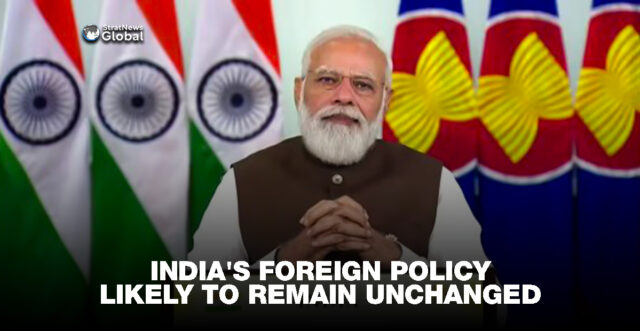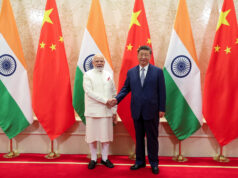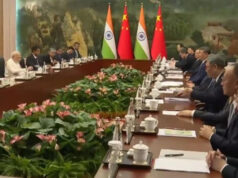On the threshold of India’s new government formation, seasoned diplomats, foreign policy experts academicians and economists see no major departure from the present government’s foreign policy. They are also confident that External Affairs Minister S. Jaishankar, a super popular career diplomat will continue to hold the much-coveted portfolio.
Across the board, experts listed China, India’s neighbourhood, Middle East and economic diplomacy as thrust areas in the new government’s foreign policy. They say that India will also work very closely with US and Quad members on international security areas in the Indo Pacific but otherwise no major departure is expected.
Former diplomat, Ambassador Syed Akbaruddin who has served as India’s Permanent Representative to the United Nations is sure that China will continue to be the focus as its impact is multi-dimensional and goes beyond the boundary question and foreign policy. “The other priorities of the government will be addressing challenges in India’s neighbourhood. Besides these, the newly elected government will focus on economic diplomacy especially culmination of Free Trade Agreements (FTAs). We have moved a little in negotiating FTA with the European Union. The other will be the FTA with U.K. which is nearing culmination. These will be top on the agenda.
Finally, the new government will pay special attention to ties with US, Russia and the Middle East, ‘’ he said.
India’s fast growing market and economy make it a lucrative option for developed and developing countries for free trade agreements. A trade deal with India would enable countries access the Indian market with less or no import duties, giving their companies an advantage.
Former Ambassador Rajiv Bhatia who is Distinguished Fellow, Gateway House, a Mumbai based think tank says that the new government is likely to focus on four key priorities in foreign policy. These include relationship with big powers like US, the European Union, Russia, China and Japan. The government will also try to hold the Quad Summit which will be a forum to develop ties with US, Japan and Australia. It is India’s turn to host the Summit and it will also bring the US President to India.
Ambassador Bhatia said that efforts will also be made to hold the annual summit with Russia which has been disrupted and reset tense and frozen ties with China which got strained since the Galwan Valley clash in 2020. Engaging with neighbours is yet another priority and there is a good chance that leaders from countries in India’s neighbourhood and extended neighbourhood, would be invited yet again for the oath taking ceremony of the newly elected Prime Minister. He said they will apply their minds to resetting relations with Pakistan although others said Islamabad may not be a priority given the role of the army and its hostility to this country. Removing misunderstandings with Maldives or have a special initiative with regard to Myanmar.’’
But this may not be that easy according to other sources who told StratNews Global that no delusions should be harboured about Beijing. Their sense is that the Chinese see India in the US camp and will formulate their policy accordingly.
Ambassador Bhatia explained, “The third priority relates to broader issues. The UN Security Council reforms which will continue to receive attention. On Africa, they have to regain the momentum because after G 20, there has been a gap. We need to produce resources for developing stronger relations with Africa. Yet another issue is about West Asia which is still burning. The war is still going on. India would remain involved it. And while talking of war, it also remains to be seen whether India will participate in the peace conference on Ukraine convened by Switzerland.’’
Former Ambassador Surendra Kumar who has served in many countries including US and UK and is Founding President of the Indo American Friendship Association says that Prime Minister Narendra Modi’s personal equation with both the former US President Donald Trump and the present US President Joe Biden, will help India-US ties remain in top gear irrespective of who becomes the new US President. Defence cooperation with U.S. will expand further. He added that India’s differences on Gaza, Iran, Russia and Ukraine, will remain manageable. Strong ties with Europe, Africa and the Gulf region will be further strengthened.
Ambassador Kumar said that some rejig can be expected in relations with India’s immediate neighbours and in the extended neighbourhood. He added that some new moves towards China and Pakistan should not be surprising though the latter will be challenging.
India will also remain active in Indo-Pacific, Quad, I2U2 and IMEC when Israel-Gaza conflict calms down.
He added that since the economy is doing well, more efforts will be invested for a permanent membership of the UNSC.
Noted economist Professor Prabir De who works with Delhi based RIS (Research and Information System for Developing Countries) does not see a discernible departure from India’s present foreign policy in the new term.
“India’s immediate neighbourhood will continue to be prioritized. So will BIMSTEC because the Prime Minister will attend the sixth BIMSTEC summit in Bangkok in September 2024. India will be working very closely with Bangladesh, Bhutan, Central Asia, Maldives, Myanmar, Iran and Sri Lanka. Central Asia will get renewed focus of the government. India will also work very closely with U.S. and Quad members on international security areas in the Indo Pacific. The Middle East will also get priority.’’
Professor De added that the action plans of the newly elected government will include implementation of India Middle East Europe Economic Corridor, renewed focus on ASEAN and East Asia and then the FTAs. “ Several FTAs are being negotiated like with the European Union and UK. FTAs will get a lot of space in India’s foreign policy. On the economic front, several projects like trade in Indian rupee globally, international payments through India’s digital payment system will also get a boost. Efforts will be doubled to achieve the oft repeated ambition to ensure that India becomes the third largest economy by 2030.’’
Md. Muddassir Quamar who is Associate Professor in Centre for West Asian Studies in Delhi’s Jawaharlal Nehru University told StratNews Global, “Middle East will figure prominently in India’s foreign policy. The India Middle East Europe Economic Corridor announced during the G 20 Summit hosted by India in New Delhi last year, is crucial for connectivity. It will take time to materialize and become dependable but India’s commitment as also that of seven other partner countries who have signed the agreement, remains intact. This is regardless of what government comes to power. IMEC remains a priority because if India wants to further expand trade with Middle East, the IMEC will afford possibility of trade with the eastern Mediterranean region and Europe as well.
The other component of connectivity is Chahbahar and INSTC. Despite all challenges, India has consistently invested in Chabahar Port in the last 20 years and that process will continue. These are two parallel tracks. Energy is also a very important component. So is FDI (Foreign Direct Investment) to India from the Gulf region. When it comes to security and strategic aspect, the Middle East region is very important because of trade routes that pass through the western Indian ocean. Our robust counter terrorism cooperation with middle eastern countries, will also continue.’’
Delhi based journalist pickled in journalism. Have reported from nine world capitals and almost all parts of India. Over the last three decades, I have worked for India’s mainstream English dailies and contributed to All India Radio, Doordarshan and Women’s Feature Service. Also worked for international media including Japan’s leading newspaper, The Asahi Shimbun and done assignments for The Sunday Times, London, The Telegraph, The Guardian and the Canadian Broadcasting Corporation. Worked in the Embassy of France in New Delhi and can speak French to save my life. Write on Diplomacy, Politics and the social sector. Love Nature, heritage, Nature, animals and vintage cars. Enjoy cycling and playing badminton.





